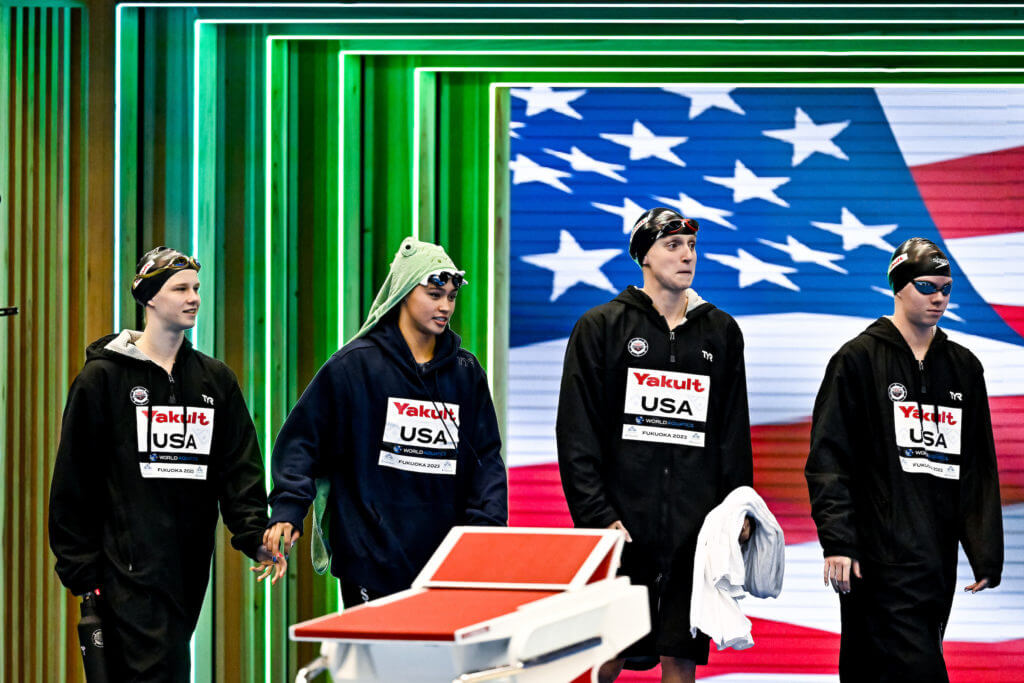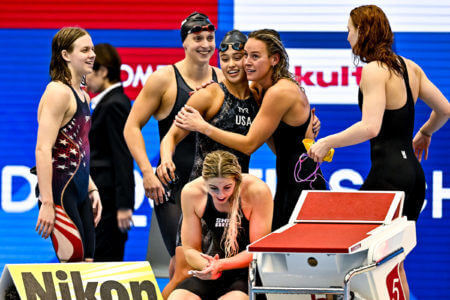American Teenagers Erin Gemmell and Alex Shackell Help Secure Silver in Promising Paris Preview

Editorial content for the 2023 World Aquatics Championships is sponsored by FINIS, a longtime partner of Swimming World and leading innovator of suits, goggles and equipment. American Teenagers Erin Gemmell and Alex Shackell Help Secure Silver in Promising Paris Preview Placing 16-year-old rookie Alex Shackell as the anchor swimmer on the U.S. women’s 800 freestyle relay in a World Championships final? Not exactly customary relay strategy, where the fastest swimmers will usually swim the leadoff leg or anchor. But the American coaching staff knew that beating Australia for a world title in the event was a tall order with the top-two finishers in the 200 free, world-record breaker Mollie O’Callaghan and Ariarne Titmus, highlighting that squad. So why not try to build a lead and see what happens? Use your fastest swimmers to get out ahead, then see what happens. Well, if the Americans wanted to upset Australia, the lead had to be at least three seconds before Titmus entered the water. Instead, Shackell had nine hundredths to work with, and to no one’s surprise, the Aussie quickly retook the lead and pulled away. O’Callaghan, Shayna Jack, Brianna Throssell and Titmus combined for a time of 7:37.50 to knock almost two seconds off the world record. But the Americans, rolling out a lineup consisting of 26-year-old Katie Ledecky and three teenagers yet to enroll in their first college class, earned a more-than-respectable silver medal, their time of 7:41.38 edging out the winning time from last year’s Worlds and setting up an extremely promising future for the U.S. in the event. Leadoff responsibilities belonged to Erin Gemmell, who missed last year’s World Championships team by one spot before rebounding later in the year to swim 1:56-low 200 freestyle times on multiple occasions. She won gold at the Junior Pan Pacific Championships and anchored the American women’s 800 free relay to a come-from-behind victory with a sensational 1:54.86 split. Gemmell, the daughter of Ledecky’s longtime coach Bruce Gemmell, has known the 20-time world champion since she was in elementary school, and she has raced Ledecky in frequent middle-distance races and trained alongside her when Ledecky returns home to Maryland for holidays. Gemmell was swimming in her first senior-level international final, but camaraderie with one of the world’s most famous swimmers made racing the world-record holder on the leadoff leg far less intimidating. “It wasn’t something that was super scary because I’m used to going up against Katie all the time,” Gemmell said. “I really tried not to let it bother me and just swim my own race and do the best I could.” O’Callaghan put Australia two seconds ahead, but Gemmell swam a lifetime best of 1:55.97. That allowed Ledecky, swimming second, to cut the deficit in half against Jack with her 1:54.39 split. Having been part of the American 800 free relay every year since 2013, Ledecky provided a calming presence for her young teammates making their debut in this spot. “I think her presence kind of helps, having someone who seems to know obviously so much of what she’s doing. She’s there if you need anything, if you ask. It’s just a good calming presence, I think,” Gemmell said. Shackell added, “I’m sure Erin has more experience with Katie, but that was my first race with her, so that was crazy from watching her in Rio and Tokyo, and actually being on her relay, definitely surreal, but it was a lot of fun, and I hope we can do it more often.” The American and Australian women congratulating each other after the women’s 800 freestyle relay — Photo Courtesy: Andrea Masini / Deepbluemedia / Insidefoto Up third was Bella Sims, now a veteran after taking part in this relay the last two years. Sims anchored the American relay to gold last year in 1:54.60, almost three seconds better than her flat-start lifetime best at the time. This year, Sims has raced in her first two individual finals at major meets (in the 400 free and 200 free), and she again showed up for the relay with a nearly-identical 1:54.64 split. Sims, set to swim for the University of Florida beginning this fall, has quickly become the veteran among the teens, learning how to be ready to perform in these big moments. “Over the past few years, I’ve learned to have fun with it, and not everything’s very serious,” Sims said. “The more fun you have, for me at least, the better I do, so that’s definitely come with being a vet.” Sims out-split Throssell by more than one second before giving way to Shackell, who no one would have imagined being in this position just over one month ago. Entering U.S. Nationals, Shackell had been expected to contend for a spot on the U.S. team in the 200 butterfly, and indeed, the teenager swam a best time in prelims and swam in second place for most of that final before fading to fifth on the final length. The next day, she swam the 200 free on a whim. “Originally, we just entered it because I had nothing else to do today,” Shackell said at the time. Shackell was part of the U.S. team at the Junior Pan Pacific Championships when Gemmell pulled off her relay heroics, and Shackell in fact captured four medals, but she was not part of the 800 free relay. The event was never considered one of her main races… until Nationals. Seeded 36th entering the meet, Shackell ended up dropping three-and-a-half seconds off her best time to qualify for the final in seventh place. At night, another second faster earned Shackell a fifth-place finish and a change in travel plans. Instead of heading to the World Junior Championships in Netanya, Israel, where she would take on a full lineup of events, she would race alongside the world’s best 200 freestylers in Fukuoka. In the individual 200 free in Fukuoka, Claire Weinstein struggled to a time of 1:57.03, good for only 12th place, so after Shackell went 1:56.05 in prelims, the American coaches opted to deviate from their original plan and ride the hot hand by inserting Shackell into the finals quartet, into the unenviable spot of racing head-to-head against Titmus. “I was told I was anchoring after my swim this morning. I just wanted to have the best race possible, put it all in the pool, not let anyone I’m racing get to me. Do my own thing and try to finish as well as I could,” Shackell said. “One of my goals was always a dream to be on the finals relay, so when I heard news, I was super excited, but I was also like, ‘Man, I’m anchoring the relay.’ That’s a lot of pressure, but it’s also a huge honor, and I wanted to represent the best I could.” Shackell acquitted herself nicely, nearly replicating her morning swim with a 1:56.38. Nothing you can do about one of the best swimmers in the world clocking 1:52.41, the fastest 200-meter relay split ever. For Gemmell and Shackell, this silver medal was their first of any color at a World Championships, and after the race, it was impossible not to look forward. Another year for these teenagers to build strength and get faster prior to the Paris Olympics? And with this initial experience in the bank? With the experience of Ledecky plus the youth of Sims, Gemmell, Shackell and Weinstein, the Americans find themselves in a promising position one year out from the Games, even in a four-second defeat. “I think is a great experience for all the youngsters and rookies on the team, just to get the experience and see what it’s like to be a part of Team USA on the world stage and big crowds and traveling across the world,” Shackell said. “Just preparing for next year, and we’re just getting started.”








Strange headline – Bella Sims is also a teenager.